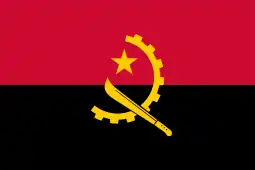| Part of a series on the |
| Culture of Angola |
|---|
 |
| People |
| Languages |
| Cuisine |
| Religion |
| Art |
| Literature |
| Music |
| Sport |
The mass media in Angola is primarily controlled by Angola's dominant political party, the People's Movement for the Liberation of Angola (MPLA).
Journalism
The country's official news agency is the government-owned Angola Press Agency (ANGOP), founded in 1975, and formerly allied with the official news agency of the Soviet Union, the Telegraph Agency of the Soviet Union (TASS).[1] "The press was nationalized in 1976."[2]
Angolan newspapers include:
Telecommunications
Television and radio
TV Zimbo in a rival privately owned channel in Angola. On December 16, 2015, a new private TV station, Palanca TV, began broadcasting from the South African satellite subscription TV provider DStv.[7]
See also
References
- ↑ Oyebade, Adebayo (2007). Culture and Customs of Angola. Westport, Connecticut: Greenwood Publishing Group. pp. 71–72. ISBN 978-0-313-33147-3. Retrieved January 22, 2010.
- ↑ "Angola: Media and Publishing". Encyclopædia Britannica. Retrieved 10 June 2017.
- 1 2 3 4 5 6 "Angola Profile: Media". BBC News. 11 April 2011. Retrieved 10 June 2017.
- ↑ "Archived copy". Archived from the original on 2003-03-14. Retrieved 2009-12-12.
{{cite web}}: CS1 maint: archived copy as title (link) - ↑ recipes, ink, cookbook. "Jornal de Angola". Retrieved 2017-07-10.
{{cite news}}: CS1 maint: multiple names: authors list (link) - ↑ "semanarioangolense.net". www.semanarioangolense.net. Retrieved 2017-07-10.
- ↑ "Palanca TV estreia na DStv" (in Portuguese). DSTV.com. 31 Dec 2015. Retrieved 2 Feb 2016.
Bibliography
- "Angola: Directory: the Press". Africa South of the Sahara 2004. Regional Surveys of the World. Europa Publications. 2004. p. 62+. ISBN 1857431839.
- Historical Dictionary of Angola (2nd ed.), USA: Scarecrow Press (published 2011), 2011-05-05, ISBN 9780810871939 (Includes information about newspapers, radio, tv)
- Rita Figueiras; Nelson Ribeiro (2013). "New Global Flows of Capital in Media Industries after the 2008 Financial Crisis: The Angola–Portugal Relationship". International Journal of Press/Politics. 18 (4): 508. doi:10.1177/1940161213496583. S2CID 146997968.
- Toyin Falola; Daniel Jean-Jacques, eds. (2015). "Angola: Media". Africa: an Encyclopedia of Culture and Society. ABC-CLIO. ISBN 978-1-59884-666-9.
- "Angola", Freedom of the Press, USA: Freedom House, 2016, OCLC 57509361
External links
- Karen Fung, African Studies Association (ed.). "News (by country): Angola". Africa South of the Sahara. USA – via Stanford University.
Annotated directory
This article is issued from Wikipedia. The text is licensed under Creative Commons - Attribution - Sharealike. Additional terms may apply for the media files.